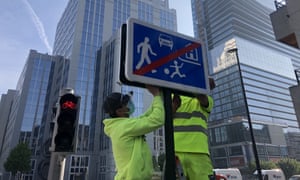Traffic jams, pretty squares used as car parks, bike lanes that vanish into congested roundabouts: Brussels’s love affair with the car has been waning for several years. Now city authorities are using coronavirus to kickstart plans to reduce the dominance of the car, by creating cycle lanes and “slow streets” that give pedestrians priority.
After traffic plunged as a result of home working, Brussels is creating 25 miles (40km) of bike lanes, including on some of the busiest arteries that connect the European district to the heart of the city.
From Monday the entire historic city centre has been turned into slow streets, where cars are limited to 20km an hour and must give priority to pedestrians and cyclists.
The idea is to give more space to city dwellers at a time when everyone is meant to keep a distance of 1.5 metres. Planners hope to reduce pavement conflicts between joggers, walkers and shoppers queuing in streets to get into supermarkets, bakeries and newsagents.

“These are temporary measures to react to the crisis,” said the Brussels mobility minister, Elke Van den Brandt. But the seeds were planted in a mobility plan drawn up after Green parties made big gains in last year’s city-region elections. While details will change once the pandemic is under control, Van den Brandt, one of three Greens with a key role in the city government, wants the move to a more pedestrian and bike-friendly city to be permanent.
“It is really important that we step into the 21st century. In the 20th century the car had absolute dominance,” she said. “We want a city where it is safe to walk and cycle, where clean air is preferred over traffic, making sure that you are not vulnerable when you get by foot or by bike … that is good for everybody.”
But not everybody is pleased. Last week Theo Francken, a prominent member of the conservative separatist New Flemish Alliance party and a former government minister, accused Brussels of “bullying” motorists who commute from neighbouring Flanders.
Francken seized on the plans as a means to further his goal of breaking up the multilingual kingdom, tweeting that Greens and the left were “determined to give Brussels back to the people of Brussels, [which is] their right. We should let that happen with teleworking and further decentralisation. Bye bye Belgium.”
Van den Brandt counters that many people in Flanders are enthusiastic about encouraging people out of their cars. Francken’s comments are “an excellent example of this 20th century view of mobility where every traffic participant has to give way to the car,” she said. “Those days are long gone.”
But can coronavirus cure Brussels of its addiction to driving? Since the 1950s, Belgian planners have been in love with the automobile, sprinkling car parks into the historic centre and slicing up once quiet neighbourhoods with multi-lane highways. The Parc du Cinquantenaire, a green space with a bombastic colonial-era triumphal arch, is split by a partially open four-lane tunnel built in the 1970s. Until 1991, it was possible to park in the gothic masterpiece of Brussels’s main square, the Grand Place, right in front of the intricately carved 15th-century Hotel de Ville, described by Victor Hugo in 1837 as “a dazzling fantasy of a poet fallen into the head of an architect”.

Even in 2020, before the virus struck other historic squares were usually packed with parked cars. Uptake of cycling is fairly low in Brussels, compared with cities of similar size, such as Amsterdam, Copenhagen, Helsinki and Munich.
“Brussels was built for commuters,” said William Todts, the executive director of the Brussels-based Transport and Environment campaign group. “The way the highways and the ring road were conceived was to make it as easy as possible to work in Brussels and get out as fast as possible. We’ve been fighting against that legacy for the last 30 years and slowly, slowly things are changing.”
With so many people working from home, he sees an opportunity “to use that new traffic situation to accelerate and consolidate some of those gains”.
But permanent change will require action beyond the city government. Belgium has been described as a “company car paradise”, for the generous perks that encourage employees to prefer shiny autos over extra salary. Employees have strong tax incentives to accept company cars, a valuable benefit when personal income taxes are among the highest in Europe.
“We created a monster and it’s very difficult to get rid of,” Todts said. “It’s not possible to get rid of the company car system, it’s too attractive.” But he thinks it can be changed by ensuring that future company cars are zero emissions – plans already discussed at national level.
The Brussels region wants the federal government – responsible for the country’s rail network – to improve train services into the city to give motorists better alternatives.
Van den Brandt also thinks a change in attitude is needed, so when the crisis is over, working hours are less rigid and people are freed from the expectation of being at their desks at 9am sharp. In Brussels, total daily peak traffic adds up to 4.5 hours, compared with 6.5 in Paris, where the 9 to 5 schedule is less ubiquitous.
“We need to change the mentality in Belgium,” she said. “Spreading out these peak hours will have a very positive effect, as well as more teleworking.”